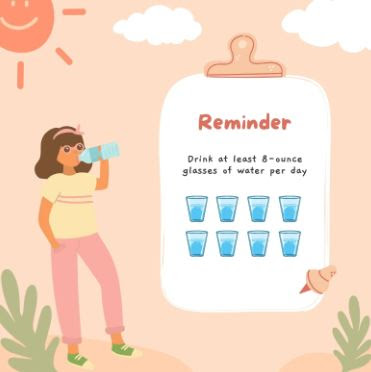Unusual Signs of Dehydration and Tips for Staying Hydrated
Hydration is crucial for survival, with vital processes in our body depending on it. Loss of water and electrolytes through sweating, urination, or illness can lead to dehydration, a condition that can impair normal bodily functions and, in severe cases, be life-threatening.
Here are six lesser-known signs that may indicate dehydration:
·
Bad
Breath: Dehydration reduces saliva production, which has antibacterial
properties. Reduced saliva can lead to bacterial overgrowth in the mouth and
subsequently, bad breath.
·
Dry or
Flushed Skin: Contrary to the belief that dehydration always causes
sweating, it can actually lead to dry, flushed skin. Dehydrated skin may also
lose elasticity, appearing "tented" after a pinch.
·
Muscle
Cramps: Often associated with exercise, especially in hot conditions,
muscle cramps can also be a sign of dehydration. This is due to impaired heat
regulation and electrolyte imbalances affecting muscle function.
·
Fever and
Chills: These are symptoms of heat illness, which is closely linked to
dehydration. If your body temperature rises due to a fever, it can exacerbate
dehydration.
·
Cravings
for Sweets: An unusual craving for sweets may indicate dehydration as the
body struggles to release glycogen, a form of glucose stored in the liver.
·
Headaches:
A common but often overlooked symptom of dehydration is a headache, which can
be alleviated by drinking water.
How to Check If You Are Dehydrated?
·
Skin Test:
Pinch the skin on the back of your hand. If it doesn’t return to normal
quickly, you may be dehydrated.
·
Urine
Color: Well-hydrated urine should be light yellow, like lemonade. Darker
colors suggest dehydration.
Effective Hydration Tips
·
Keep a
Water Bottle: Having water within easy reach can help maintain hydration
throughout the day.
· Enhance Water Flavor: Add fruit or opt for naturally flavored seltzers if plain water doesn’t appeal to you.
·
Choose
Hydrating Foods: Consuming water-rich fruits and vegetables like cucumbers,
strawberries, and tomatoes can help maintain fluid balance.
·
Drink
Regularly: Include water during meals and throughout the day to support
hydration.
Special Considerations for Older Adults
Older adults are at increased risk of dehydration due to a
natural decrease in thirst sensation and potential limitations in mobility or
cognitive function. Monitoring fluid intake is crucial for preventing
dehydration-related health issues in the elderly.
Unusual Signs of Dehydration in Pregnancy: Symptoms, Risks, and Prevention
Importance of Hydration
Maintaining hydration is essential for overall health, as
water comprises about 60% of the human body. Staying adequately hydrated helps
ensure that all bodily functions run smoothly, supporting everything from
digestion to cognitive performance.
Implementing these insights into daily life can
significantly reduce the risk of dehydration and its associated health
complications.

.png)
Comments
Post a Comment